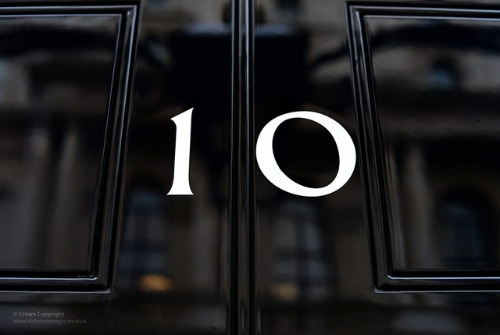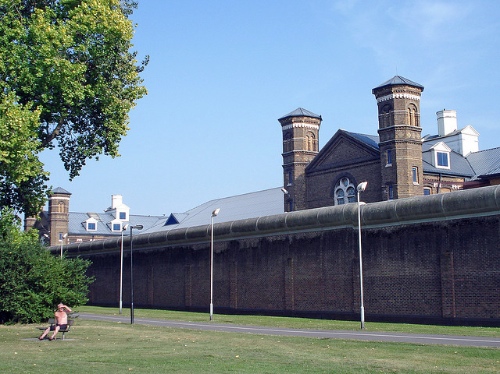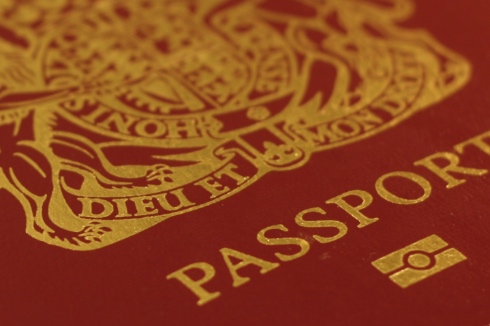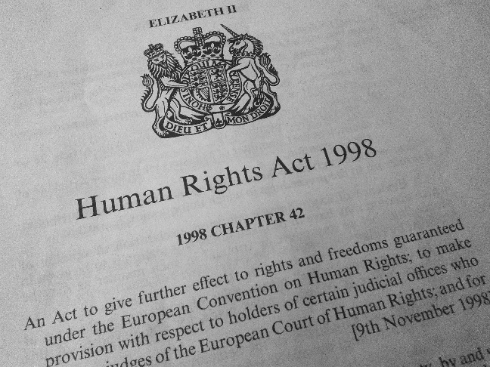Ed can enter No. 10 without Nicola’s keys
 This election looks a close-run thing – very close run indeed. As I write, polls and forecasts suggest strongly that no party’s going to get near a majority. There’s a lot of talk about what could happen after May 7th. And an idea’s beginning to take hold that, in a hung Parliament, Ed Miliband would need some sort of advance promise of support from the Scottish Nationalists before the Queen would appoint him Prime Minister.
This election looks a close-run thing – very close run indeed. As I write, polls and forecasts suggest strongly that no party’s going to get near a majority. There’s a lot of talk about what could happen after May 7th. And an idea’s beginning to take hold that, in a hung Parliament, Ed Miliband would need some sort of advance promise of support from the Scottish Nationalists before the Queen would appoint him Prime Minister.
That, though, is a wrong reading of the constitution. Except by allying with the Conservatives no smaller party – whether the SNP, the Liberal Democrats or even both together – can deny Ed Miliband “the keys to Number 10”. Let me explain.
Under our Parliamentary system, the test for whether a Prime Minister can govern or not is whether he (or she) commands a majority in the House of Commons. Once it’s clear to the Prime Minister that he no longer does so, by convention he should resign. It used to be the case that he had the option of asking the Queen for a general election if he lost the confidence of the House mid-term: that option is now removed by the Fixed-term Parliaments Act 2011.
But we’re interested not in the mid-term position: only in the situation immediately following an election. Even before the 2011 Act, by convention the Queen would not have granted a second dissolution of Parliament to a Prime Minister who’d just lost an election a few days or weeks before. On this, the constitution is unchanged. The Prime Minister resigns once it’s clear he no longer commands a majority. That’s what we’re used to seeing happen in the past, when one party lost an election, and the other clearly won it.
This is how it’s explained in one of the leading constitutional law textbooks, Bradley and Ewing (15th edition):
by a long-standing conventional rule, the government must have the confidence of a majority in the Commons. Therefore, when it is clear from election results that the Prime Minister … has lost the election and another party has been successful, he or she must resign immediately without waiting for the new Parliament to meet.
All very simple, when one side losing its majority at the election amounts to the same thing as the other being successfully achieving one. The problem about hung Parliaments is that they can break that equation. The government can lose its majority without anyone else winning one.
So which side of the equation matters then, in constitutional terms? Is the PM entitled to carry on, even if it’s clear he himself will have no majority, until someone else succeeds in achieving one? Many have I think been misled by the events of 2010 into thinking so. But actually it’s the existing Prime Minister’s loss of a majority that is decisive. It remains the case that by convention he must resign once it’s clear he no longer has one: whether anyone else does is irrelevant.
A vital point to understand is that the duty to resign only arises when it’s clear that the PM’s majority is gone. He’s entitled to carry on as long as he might still have one (as Ted Heath did in February 1974). Ultimately, any uncertainty is resolved in the House of Commons itself. If he seriously thinks he can present his plans and win MPs’ approval for them after the election, David Cameron will be entitled to carry on and test the opinion of the House (as Stanley Baldwin did in 1924). But lose that vote on the Queen’s speech and his moment of clarity, and resignation, will have arrived.
This is the moment at which the “hidden keys” theory would be seen to be correct, or wrong. Would the Queen refuse to appoint Ed Miliband if he had no deal with another party showing his command of a majority? Would the Queen make him wait until he’d done such a deal? Would she allow or require Cameron to carry on regardless? Let’s see what monarchs have done in the past.
In 1924, as I’ve said, Baldwin came back following a general election to test the opinion of the House. At that election, his Conservatives were by some margin the biggest party: he had 258 of the 615 seats. But Labour on 191 and the Liberals with 158 ganged up to vote him down, and forced his resignation. As Nicola Sturgeon might put it, together they “locked Baldwin out of Downing Street”. The King appointed Ramsay MacDonald, the leader of the next largest party, without any question of his first having to prove he had a majority of his own. What happened is explained by Professor Rodney Brazier in his excellent book Constitutional Practice. Notice what he says at footnote 26 on page 34:
The National Executive Committee resolved on 12 December 1923 that the “Parliamentary Party should at once accept full responsibility for the Government of the country without compromising itself with any form of coalition”: The Times: 14 December 1923.
MacDonald’s government lasted only nine months. But the example shows that when the PM resigns, the minority leader of the biggest opposition party can expect to be appointed in his place even if he refuses any deal with others. Notice, also, that MacDonald had fewer seats than Baldwin.
In 1929, Baldwin resigned immediately following an election at which his party had won 260 of the 615 seats; again, MacDonald was appointed to lead a minority government, having only won 287 seats. There was no question this time either of his having first to prove he’d secured support from anyone else. His minority government lasted two years before MacDonald split Labour by going into coalition with the Tories.
In February 1974, Ted Heath won only 297 of the 635 seats. He tried to do a deal with the Liberals, who had 14, assuming he could also persuade the 7 Ulster Unionists to back him. But he could reach no agreement with the Liberals, and Heath resigned the Monday after the election. The Queen immediately appointed Harold Wilson to replace him. Wilson had 301 seats – admittedly a few more than Heath.
But it’s important to notice that this fact alone did not mean the Queen summoned him the morning after polling. He was appointed only after Heath resigned, in accordance with convention. And he was appointed in spite of having made clear he sought no deal with any other party. As this contemporary civil service note says,
Mr. Wilson had issued a statement making it clear that he was prepared to form a minority Labour Government but not to enter into any coalition or understanding with other parties in the House.
Yet again, we see that Wilson was appointed as a matter of course, the PM having resigned. His minority government lasted seven months before he won a knife-edge majority that October.
The example that may confuse people is 2010. The fact that Gordon Brown stayed on for five days after the election while the Conservatives and LibDems negotiated has I think given the impression that he resigned, and that a Conservative PM was appointed, only because a coalition deal gave Cameron a majority; that Nick Clegg “held the keys” to Downing Street. But the impression’s misleading, in a significant way. One particular detail is telling: Brown resigned before the coalition deal was struck.
They real “key” to understanding 2010 is to realise that the position of the LibDems, whose talks with both the main parties showed that (at least in theory) they might support either, more or less restored the equation between one side achieving a majority, and the other side realising it had lost one. So long as the LibDems might support him, Brown had the prospect of a majority, or at least being best placed to achieve one. But by the Tuesday, it was clear to him that prospect had gone. Tory-LibDem talks had reached the point where it was clear to Brown (whether Nick Clegg actually sealed the deal with the Tories or not) that he’d lost command of the House. He resigned; and Cameron as leader of the biggest opposition party was summoned as a matter of course.
Having gone through the history, now let’s look at how constitutional experts explain the position. Bradley & Ewing again:
Where the result of the election gives no party an overall majority in the Commons, the Prime Minister may continue in office for as long as is necessary to discover whether he or she is able to form a coalition or to govern with the support of other parties.
Not, you note, until some other combination of forces proves it has a majority.
Brazier says
If the party Leaders were to agree within a few days that a majority coalition could not be formed and that a minority government should take office (as in 1974) the succession question would be decided. The Queen, acting on the views of the party Leaders as published … would perform without controversy her dignified function of receiving the outgoing Prime Minister’s resignation and appointing his minority successor.
All it would take of course for it to be clear no majority coalition could be formed would be for Ed Miliband to refuse one in advance – like both MacDonald and Wilson.
Professor David Feldman puts it this way in his book English Public Law:
If there is a ‘hung’ Parliament, with no party in overall control, the monarch invites first the incumbent Prime Minister to continue in office; if he is unable to do so, then the leader of the largest opposition party is appointed Prime Minister.
This, of course, is precisely the principle I’m arguing for. Feldman cites what was written in a 2004 article in the journal Public Law by Professor Robert Blackburn, who explained
The incumbent Prime Minister has the first opportunity to continue in office and form an administration. If he is unable to do so (and resigns, or is defeated on the Address at the meeting of Parliament), then the leader of the largest opposition party is appointed Prime Minister.
The “Address at the meeting of Parliament” he mentions is the debate on the Queen’s speech. Professor Blackburn puts the same point in a very balanced way as author of the constitutional law section of Halsbury’s Laws of England (5th edition, 2014, §204):
a consensus is lacking as to what is the appropriate procedure to be followed if no party commands an overall majority. Some hold that the leader of the largest opposition party should be convention automatically be asked.
He himself holds that position, as we’ve seen; and in a footnote he adds that
This outcome was arrived at, for instance, following the inconclusive general elections of 1924, 1929, February 1974 and 2010.
But what alternative opinion might anyone else “hold”? Professor Blackburn explains that
In its account of existing practice the executive leaves open the possibility of a range of options, though emphasises the idea of political leaders resolving the issue between them and not drawing the monarch into party political decisions.
This “executive account of existing practice” is the Cabinet Manual, which calls itself a “guide to laws, conventions and rules on the operation of government” and “an authoritative guide for ministers and officials”. So we can assume it represents the advice the Cabinet Secretary will give both the Prime Minister and Buckingham Palace. It says (para 2.8)
Prime Ministers hold office unless and until they resign. If the Prime Minister resigns on behalf of the Government, the Sovereign will invite the person who appears most likely to be able to command the confidence of the House to serve as Prime Minister and to form a government.
It’s worth noting that a person most likely to command a majority is a different thing from a person who’s already shown he can do so. The Cabinet Manual puts it another way in the following paragraph (2.9):
In modern times the convention has been that the Sovereign should not be drawn into party politics, and if there is doubt it is the responsibility of those involved in the political process, and in particular the parties represented in Parliament, to seek to determine and communicate clearly to the Sovereign who is best placed to be able to command the confidence of the House of Commons.
Again, the Cabinet Manual avoids suggesting an incoming PM must prove he or she already has a majority; the person appointed will be whoever is best placed to achieve one. That, if David Cameron resigns in May this year, is bound in reality to be Ed Miliband. There’s little if any difference between what Professor Blackburn and the Cabinet Manual each “hold”.
I must just mention the one theoretical circumstance in which Miliband might not be “best placed” if Cameron resigns in May. If it became clear not only that no other party would support Ed, but that MPs were rallying in large numbers behind some other figure, then that person might be best placed to command the House.
Feldman (who, you’ll remember, agrees with Blackburn and with me on the basic principle) covers this situation at a later point in English Public Law:
If in such a situation the incumbent Prime Minister finds that he or she is unable to command a majority in the House … the Queen will invite another person to see if he or she can form a government. This person may be the leader of the largest or next largest party in the House of Commons apart from that of the previously incumbent government. However if another person can command a majority in the House, for instance through a coalition or pact formed from two or more smaller parties, the sovereign may invite that person to form a government.
But who would that person be this May? Nick Clegg? And who’d be his supporters? Even with, say, 30 LibDem MPs, 50 from the SNP, the Greens, Plaid Cymru and all the Northern Irish parties, he’d still need many Tory or Labour defectors to displace Ed from pole position. This is all so far-fetched that it can just be dismissed for practical purposes.
Brazier says (he actually has in mind a coalition between the “outgoing” PM and others, like Ted Heath; but his point could apply in Feldman’s situation) that where a putative coalition has a real claim to have more seats at its disposal than the opposition leader, the Queen should wait to see if it can achieve a “copper-bottomed agreement” before appointing anyone else. But even in that example (in which helpfully for our purposes he casts Labour as the opposition), Brazier says, returning yet again to the fundamental principle I’ve been arguing for, that
If after the party negotiations no such copper-bottomed coalition agreement were to prove possible, the Queen should accept the outgoing Prime Minister’s resignation and appoint the leader of the Labour Party as minority Prime Minister.
If it becomes clear after May 7th that David Cameron no longer commands a majority and cannot continue in office, then in accordance with convention he’ll resign; and all precedent, all expert opinion and the Cabinet manual itself tell us the leader of the largest opposition party will be appointed Prime Minister. Miliband won’t first need to ask Sturgeon to go looking in her handbag.
How long his government could survive is a separate question.
My e-book What a Fix-Up! tells you everything you need to know about the Fixed-term Parliaments Act. Read about it here, and buy it here.



